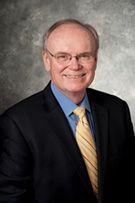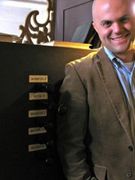 | | Nicholas Zork |
Liturgical Lessons from the Decalogue: Honoring Father and Mother
By Nicholas Zork
"Honor your father and your mother, that your days may be prolonged in the land which the Lord your God gives you." (Exodus 20:12 NASB) In the Twenty-First Century, the word "new" has become nearly synonymous with "good" - or at least "better." And Christian worship is not immune from the cults of novelty and progress. The desire to innovate is understandable. The world we have inherited - including our worship practices - must be critically assessed. "Old" is, of course, not synonymous with "good" either. But innovation without an appreciation for the past is unwise and probably impossible. Innovation and tradition, creativity and memory should be closely linked in Christian worship. Even the Psalmist's invitation to "Sing to the LORD a new song" is also a call to remember God's "wonderful deeds among all the peoples." (Psalm 96:1a; 3b NASB) Memory is built into the rhythm of Adventist worship as we "remember the Sabbath, to keep it holy." (Exodus 20:8 NASB) But the Fourth Commandment is not alone in encouraging us to worship God with a sense of the past. In fact, it is immediately followed with an exhortation that has profound implications for Adventist worship: "Honor your father and your mother, that your days may be prolonged in the land which the Lord your God gives you." (Exodus 20:12 NASB) The Fifth Commandment is a reminder to honor not only our biological parents but those from whom we have inherited our faith. It is an admonition to respect the wisdom of those who have gone before us. With regard to Christian worship practice, this doesn't mean we should embrace every liturgical tradition of our foremothers and forefathers. But can we truly honor our fathers and mothers if we abandon the hymns they have passed down to us? Should not their prayers be given new breath in our mouths? Should not the melodies and rhythms that resonated in their bones resonate in ours as well - even as we also sing "a new song"? There is a troubling conceit in some contemporary worship reforms, which often fail to draw from the majority of Christian history. This is, of course, just one form of the pride and myopia that plagues us all. But it prevents us from truly honoring our spiritual mothers and fathers. And without their liturgical wisdom, our worship of God is not as rich as it could be. What hymns of the faith, what ways of singing, what prayers of the men and women whom God has sustained in the past might help us remember God's faithfulness to us in the present and for all eternity? Share your thoughts in our Facebook dialogue.
|
 | | C. Michael Hawn |
You Are What You Sing: Global Song in the 21st Century
By C. Michael Hawn
In the 1950s, two-thirds of the church resided in North America and Europe. In the second decade of the twenty-first century, two-thrids of Christians now live in the southern hemisphere. The Gospel was taken to the ends of the earth in the great mission movement of the 18th, 19th, and first half of the 20th century. With the missionaries came the songs of the northern-world church. These songs have been learned and loved around the world. One sign of the effectiveness of the modern mission movement is that the Gospel has taken root in the soil of the former mission fields. During the last fifty years, the church beyond the north has been sending its songs to us. They bear witness to the faith with fresh insights and offer us the opportunity to gain a global understanding of our faith not available to earlier
generations. These songs are more than melodies and words. They are gifts to us from a vigorous and growing body of believers. The demographic shift from the north to the south offers us the opportunity to live in a reciprocal relationship with the church universal, sharing in the pain and suffering as well as the
joy and hope of the global church. Editor's note: Michael Hawn will explore this topic and more as a featured presenter at the upcoming Andrews University Music & Worship Conference, Jan 9-11, 2014. |
 | | Andres Flores |
El Valor de la Autenticidad en la Adoración Pública
Por Andres Flores
Algunas cosas se comprenden mejor hasta que se experimentan. El Sábado anterior en mi Iglesia reaprendí lo que significa adorar con un gozo vibrante. No era un congreso de jóvenes, o un "evento especial," pero ciertamente algo especial sucedió en nuestra iglesia. Epic Church es una Iglesia compuesta por creyentes de segunda y tercera generación en la ciudad de Chicago. Estos adultos y jóvenes adultos han experimentado toda clase de estilos de adoración, otros son creyentes nuevos los cuales están en busca de un encuentro real con Dios. "Crear" servicios de canto que sean relevantes para tal audiencia puede ser un desafío, considerando que se tiene un grupo de gente que tienen diferentes expectativas y necesidades. Volviendo a nuestra historia: El Sábado sucedió algo que me recordó cuan importante la autenticidad es para el líder de adoración. Ron se encontraba un poco enfermo, pero la congregación sintió que a pesar de su condición el estaba dirigiendo los cantos consiente de la misma presencia de Jesús con su pueblo. El estaba bien preparado junto con los músicos y cantantes. La iglesia se conmovió al notar que aun al estar débil, el lo dio todo en el altar de la adoración a Dios. Los cantos fueron energéticos, se leyó la biblia y se elevaron oraciones como parte del servicio de canto. La voz de Ron no estaba en su óptima condición, pero la congregación conectó con el trono de Dios por que Ron estaba auténticamente conectado con Cristo. Y esto fue suficiente para animar al pueblo a "adorar el Señor con regocijo" y elevar "cantos de jubilo." (Salmo 100:2).
Estar auténticamente rendidos(as) a Cristo es algo imprescindible para los lideres de adoración. La autenticidad crea un ambiente de honestidad y transparencia a pesar de nuestras debilidades humanas. Ser reales, auténticos, y transparentes nos ayuda a llevar a la Iglesia a encontrarse con un Dios real.
|
 | | David Williams |
"And I saw another angel. . . having an everlasting gospel. . . to every nation, tribe, tongue, and people. . . saying, 'Fear God, and give Him glory, for the hour of His judgment has come; worship Him.'" At the core of the Seventh-day Adventist mission is worship. Worship the Creator. This worship is founded, not on our experience, not in our liturgy, but upon the Person who created us. He is a relational being that wants to be with us. He wants to talk to us. He loves us so much; He even died for us to save us from our selfishness. This is the everlasting gospel. Because of this Good News, we are invited to worship Him. But how?
Since the beginning, Christians have wrestled with how God is to be worshiped. Some sought Him in the Eucharist, some sought Him in preaching, and some think He is in the music. An Adventist biblical understanding strongly teaches that God is to be worshiped in His sanctuary - "for the hour of His judgment has come." God's presence is to be experienced in His sanctuary through the mediation of Jesus Christ our High Priest.
Christ mediates the reality of our worship through His ministry in the Word, Scripture, through the Holy Spirit. Jesus said, "Abide in Me, and My words abide in you" (John 14:7). He wants to have a relationship with us through His Word, for it is in His Word that He speaks to us through the Holy Spirit. His greatest desire is to communicate with us-commune with us. But did you know? We are to share this communion with each other? And through music?
"Let the Word of Christ richly dwell within you, with all wisdom teaching and admonishing one another with psalms and hymns and spiritual songs, singing with thankfulness in your hearts to God" (Col 3:16).
Music is not the thing - the point. "Thankfulness in one's heart" - worship - is the point. But see what music does? As Lilianne Doukhan astutely points out, sanctuary music "was meant to accompany and beautify acts of adoration" (In Tune with God, 108). Music is the beautiful trimmings to our worship. It functionally adds a pleasing experience and is participatory, inviting one another to join in "making melody with one's heart to the Lord" (Eph 5:19).
Historically, however, this has not always been the case. Often in congregations and ecclesial bodies, certain ethnicities are left out, prevented from participating in the praise to which God has called them. They are deprived of the sacrifice they rightly owe as a royal priesthood - the sacrifice of the heart in worship. They are prevented from worship when they are not included in the music making.
Why is it that the 1941 Church Hymnal excluded any and all Negro Spirituals from its corpus? (The so-called "white" spirituals of Millerism were also greatly excluded). It wasn't until 1984 that the Spirituals were included in Adventist hymnody. Similarly, why are Asian hymns, and African hymns, and traditional hymns, and contemporary hymns excluded from certain modern worship collections?
Today, prejudice continues to pervade our congregations. Sabbath mornings continue to be the most segregated hour of the week - even in multi-ethnic congregations. If the invitation to worship is for all people, then shouldn't all the people get to join in beautifying the worship?
I would like to suggest that your congregation is more diverse than you think it is. You may not have a rich diversity of ethnicities in your congregation, but you probably have a broad range of age groups in your church. As pastors and pastoral musicians, how can you bring all these age groups and people groups together in beautiful praise? Through music. Enjoy sharing with one another the songs of your experience.
My local church in South Bend, Indiana is very diverse in age and ethnicity. Next Sabbath, our Sabbath School class will present a song in 6 languages that represent people from our class. What I find to be more beautiful than the music is that each person in the group feels welcomed and validated in their participation in the worship. They can approach the throne of grace with confidence, without shame or prejudice.
When we gather to offering our praise next Sabbath, I am assured that "precious songs of praise and thanksgiving will be heard in the assembly of the saints. [. . .] We shall see our Advocate offering up the incense of His own merits in our behalf. When we see this as it is, and as the Lord would have us, we will be filled with the sense of the immensity and diversity of the love of God" (Ellen G. White to William C. White, June 10, 1897, [Letter 138, 1897], Ellen G. White Estate, Silver Spring, MD).
|
 | | Eddie Cornejo |
Proclaim, a New Solution
Logos has added a new tool to their array of Bible and church software - Proclaim. This worship presentation tool has a number of useful features:
- Cloud based - edit on a home PC and and presentation is ready on the church PC
- Attractive interface
- Integration with Song Select for lyric import and Planning Center for order of service and other information
- Integration with Logos for Bible verse/translation import
- Displays images, video, Bible, lyrics, and more
Syncing your presentation through the cloud with multiple computers makes proclaim an awesome tool for people who edit their presentations on one computer and display them on another. Teams can also work on the presentation at their various work stations and everything shows up on the computer in the worship space. No more last minute edits, and USB drives going around.
The Logos and Proclaim team with be joining the 2014 Andrews University Music & Worship Conference. They will also have a workshop at the Conference, which you won't want to miss.
|
|
| Featured Event |
Andrews University Music & Worship Conference
January 9-11, 2014
Hosted across the Andrews University campus, this Conference will provide biblically grounded training opportunities for church musicians, pastors, worship leaders, and anyone involved in worship ministry. Presenters will discuss principles and practices for worship ministry that glorifies God, transforms worshipers, and changes the world. As a participant, you will have access to a variety of seminars, workshops and worship experiences.
Come and be inspired to honor God more fully in your worship. Be equipped to minister more effectively through worship and worship music. Connect with others who share your passion for God and commitment to service.
Don't miss this exciting opportunity to worship and learn together!
Registration and further info is available through the Andrews University Music & Worship Conference website.
|
| To the Point |
"While music in its myriad cultural manifestations has been a metaphor of Christian unity since the beginning of the church, it is not the universal language that some glibly assume. Sung prayer may function, however, to bring unity out of diversity. This is not a unity forged through uniformity of perspective, but a unity that reveals the diversity of God's creation."
Michael Hawn, Gather into One: Praying and Singing Globally
|
|